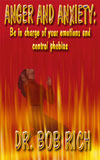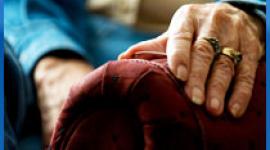Gaining Control of Your Fear
 Your life is not in danger. During a panic attack, the sufferer is often convinced that s/he is having a heart attack or a stroke, and is dying. THIS IS NOT SO. The symptoms of heart attacks and strokes are quite different from those of extreme fear.
Your life is not in danger. During a panic attack, the sufferer is often convinced that s/he is having a heart attack or a stroke, and is dying. THIS IS NOT SO. The symptoms of heart attacks and strokes are quite different from those of extreme fear.
A panic attack is maintained by fear. Are you brave enough to try the technique of 'paradoxical intention'? All you have to do is to WILL the panic attack to hit you. Invite it. Dare it. This is particularly effective for people whose panic is predictable: occurs in particular circumstances. Go into the feared situation and say within your head: "Come on, you wretched panic: hit me! Go on! I'm not afraid of you!" If it helps, have a trusted friend with you for support.
The panic will be helpless against you, will not be able to touch you, AS LONG AS YOU REFUSE TO BE AFRAID OF IT!
A panic attack is not a sign that you are going crazy. It is true that you are in the grip of something and therefore 'out of control' of yourself, but the symptoms and feelings are very different from those of any mental illness. They are exactly the same as those of a person in extreme physical danger. They occur in response to A SIGNAL YOU ARE MISINTERPRETING, THEN THE FEAR IS MAINTAINED BY WHAT YOU THINK ABOUT YOUR FEELINGS IN RESPONSE TO IT. The fear is real. It is not an illusion or a hallucination. You are not crazy.
A panic attack is not a sign of weakness. Anyone can have them, in the right (well, wrong) circumstances. I once had one while watching my daughter stand on the bottom rail of a wrought iron safety fence, at the top of a very tall tower. I had the unreasonable feeling that, regardless of the laws of physics, she could topple over the fence (which was above her chest height) and fall to her death. I knew this was unrealistic, but could not stop an extreme fear reaction. Fortunately, I knew enough to bring myself out of it, and it has never recurred. Had I been less knowledgeable about psychology, I might now have a full-blown phobia.
You can control it. Just knowing the above facts can help a person get rid of panic attacks, EVEN IF THEY HAVE BEEN A PROBLEM FOR MANY YEARS. When you feel the next panic attack coming on, say to yourself: "This will be uncomfortable, but it cannot kill me. It's not a sign that I'm going crazy. If I can stop being scared, it will never come back. Anyone can have a panic attack."
Feelings of terror or impending doom, including full-blown panic attacks may be side-effects of drugs such as marijuana, amphetamines, caffeine taken to excess, or for certain people, even certain food additives.
Control is the Key
 Here is a very slightly modified extract from my book, 'Anger and Anxiety: How to be in charge of your emotions and control phobias.'
Here is a very slightly modified extract from my book, 'Anger and Anxiety: How to be in charge of your emotions and control phobias.'
"Abigail was shopping at the local supermarket when she suddenly had a 'queer turn'. Her vision went blurry, and there were spots dancing before her eyes. She felt dizzy, and had to hang on to her trolley to avoid falling. Heavens! she thought, I'm having a stroke or a heart attack!
Immediately she had this thought, she felt a pain in her chest. It was as if a steel band was constricting her lungs — she just couldn't get enough air. Her heart was beating so hard she could feel it. And it was very rapid. Her face and body were covered with cold sweat.
Somebody noticed her distress, she was looked after and driven home. This terrible experience did not recur for awhile, even back in the same shop. But months later, in a different place, suddenly it happened again.
After this, the panic attacks (as Abigail now knew them to be) occurred with increasing frequency, always in a crowded store. Then they spread to other situations. When I met Abigail, I had to go to her house to see her — she was unable to leave home.
This is 'agoraphobia'.
I don't know what set off the first attack. It could have been a temporary drop in blood pressure. She could have been coming down with an ear infection which affected her sense of balance. Perhaps some smell, or a combination of things around her, brought back a long repressed terrifying situation from her infancy. Whatever it was, she misinterpreted the symptoms as life threatening. Then she panicked in response to this fear.
While this first panic attack was in full flight, Abigail was surrounded by sights, sounds, smells, touches on her skin, sensations within her body, thoughts in her head. Any of these, or any subtle combination of them, had the chance of becoming new triggers for the fear. For example, the new 'signal' might have been the sight of a packet of self raising flour while a particular tune was being played on the store's sound system, combined with the feel of the cold steel of the shopping trolley's handhold. This particular complex (whatever it was) didn't recur for a few months. When it did, it was in a different place. It set off the second panic attack. Again, there was a good chance that a new constellation of sights, sounds, smells, feelings, whatever, would become a signal for the fear.
So, over time, the fear could be induced by a growing number of signals, until Abigail was imprisoned by her fear of the fear.
[I have to say here that there are different, competing explanations for how agoraphobia arises. I believe that the 'classical conditioning' model I described is correct — otherwise I wouldn't have used it. However, there is no controversy over the method for controlling agoraphobia. The method is described in Chapter 5 (page 23).]
Classical conditioning is how we pick up our automatic ways of responding to our experiences: to the world around us, to the sensations in our body, to the thoughts and emotions within our consciousness. A tune or a smell can vividly bring back apparently forgotten memories, or merely the emotions you experienced back then. You might respond with strong emotion (positive or negative) to a stranger. Unknown to you, you are reacting to some similarity between this person and somebody from your past. Parents tend to treat their children in exactly the way they were treated when little, often without realizing it. Prejudices, likes and dislikes, ways of responding to novel situations are all affected by conditioning from the past.
We couldn't function without having this storehouse of automatic ways of responding. But sometimes, our conditioned habits are no longer relevant, or, as in this example, they are unfortunate and distressing.
About the author: Dr. Bob Rich, author of Anger and Anxiety, is a psychologist based in Australia. He is a member of the Australian Psychological Society, College of Counselling Psychologists Associate Member, and Australian Society of Hypnosis.
next: PTSD: Critical Incident Debriefing
~ anxiety-panic library articles
~ all anxiety disorders articles
APA Reference
Staff, H.
(2007, February 23). Gaining Control of Your Fear, HealthyPlace. Retrieved
on 2026, March 4 from https://www.healthyplace.com/anxiety-panic/articles/gaining-control-of-your-fear



